Getting Started
This section was written on the assumption that the use of WIZ510SSL evaluation board.
Unpacking the WIZ510SSL Evaluation Kit
What's in the Box?
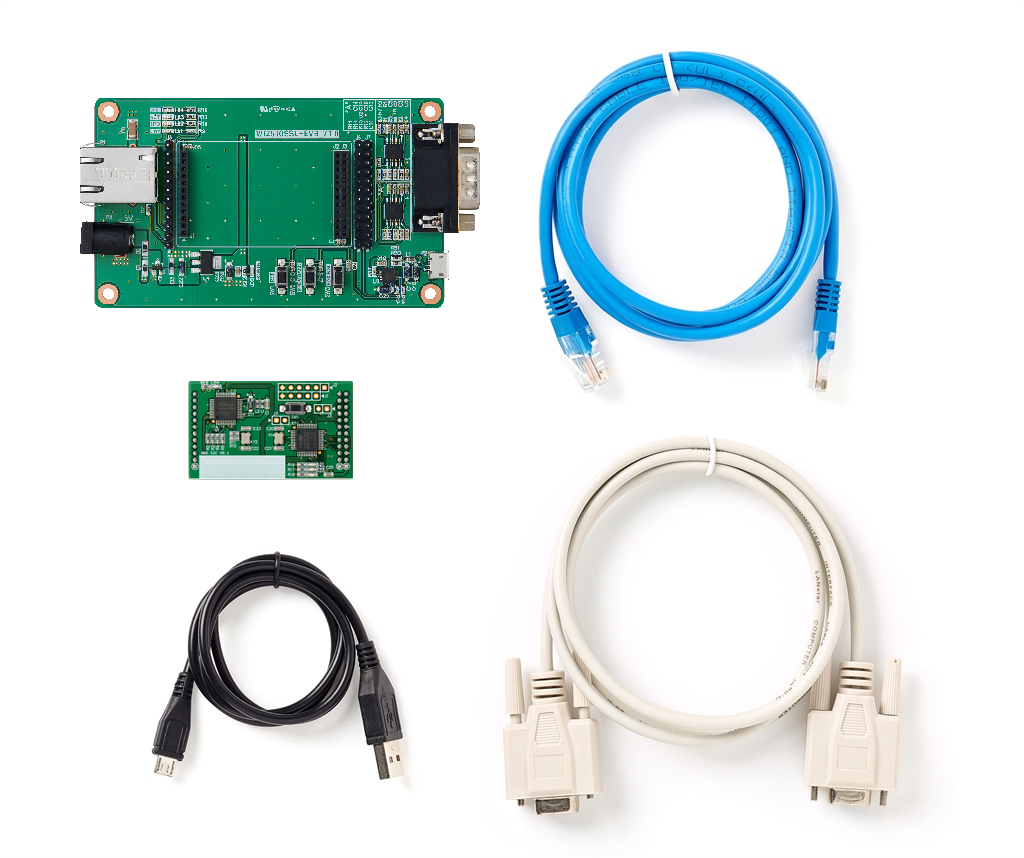 |
| Figure: WIZ510SSL Rev. 1.0 evaluation board package |
The WIZ510SSL evaluation board package contains the following parts.
- WIZ510SSL Module
- WIZ510SSL-RS232/TTL-EVB Evaluation Board
- Cables (Ethernet / Serial / Micro USB Type B)
The entire list of parts of the board is available at the WIZ510SSL Overview: Product Contents page.
Device Layout
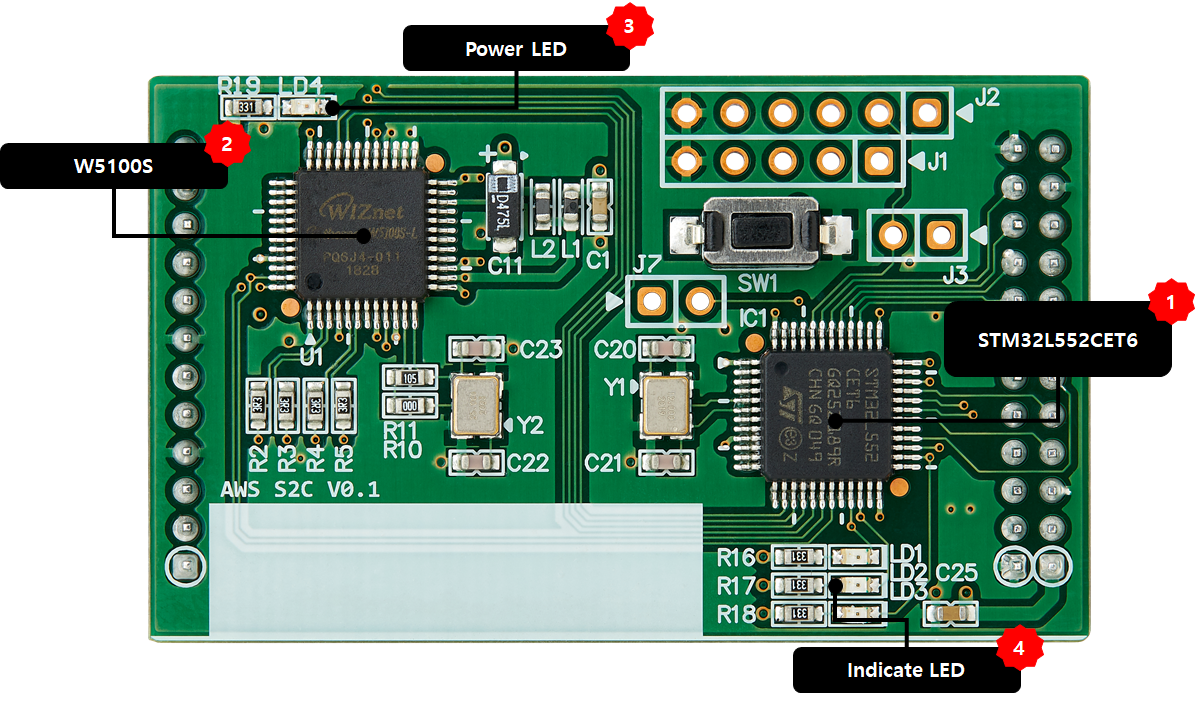 |
| Figure: WIZ510SSL Rev. 1.0 top |
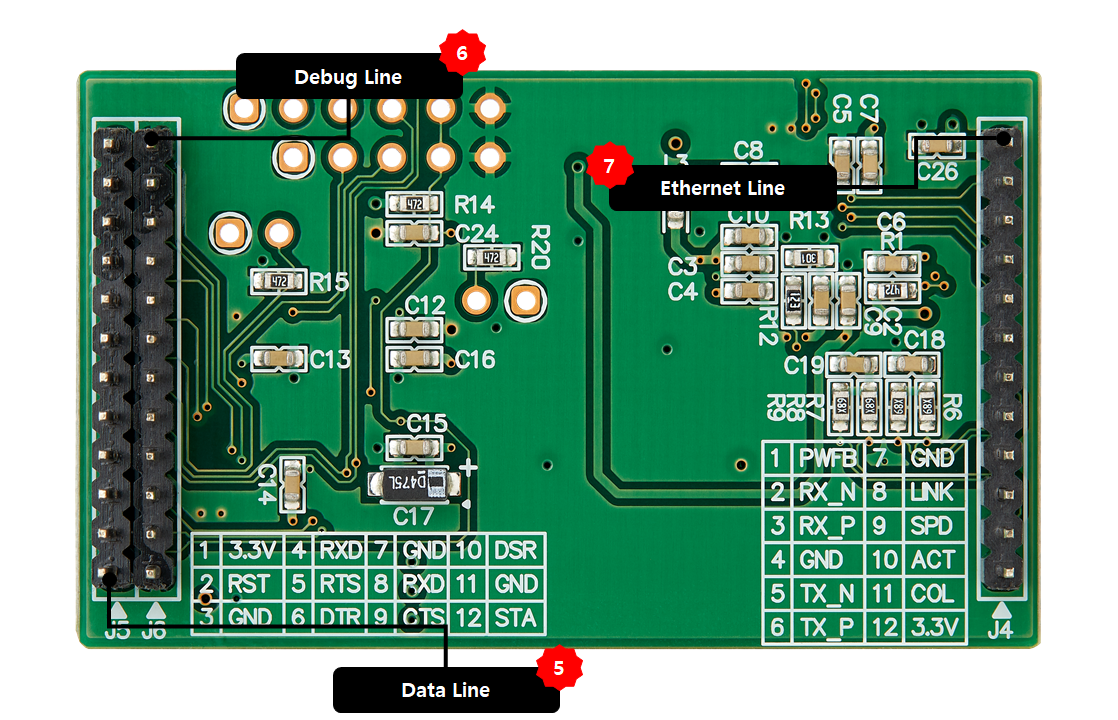 |
| Figure: WIZ510SSL Rev. 1.0 bottom |
Parts
- STM32L552CET6 based on ARM Cortex-M33 [1]
- W5100S with Hardwired TCP/IP and PHY [2]
- Power LED (red[LD4]) [3]
- Status LED (green[LD1]: PHY link status / green[LD2]: TCP connection status / green[LD3]: not defined) [4]
Interfaces and Ports
- Data UART Port: 6x1 2.00mm Pin header (Data UART pin / MCU reset pin / GND) [5]
- Debug UART Port: 6x1 2.00mm Pin header (Debug UART pin / MCU boot pin / GND) [6]
- Ethernet Port: 6x1 2.00mm Pin header (Ethernet pin / GND) [7]
Prerequisites for Setup
Software
- Configuration tool program (Github page)
- TCP server / TCP client / UDP terminal program
- Serial terminal program
Hardware
- WIZ510SSL module and evaluation board
- Ethernet cable
- USB type B cable (for Debug UART)
- DB9 serial RS-232 cable (for Data UART, RS-232/TTL Ver. only)
- Power source for device
- Such as 5V DC adapter, USB port on your computer, or 3.3V Power source
Connect Your WIZ510SSL
WIZ510SSL Factory Settings
| Network Settings | Local | IP address | 192.168.11.2 | - |
|---|---|---|---|---|
| ::: | ::: | Gateway address | 192.168.11.1 | - |
| ::: | ::: | Subnet mask | 255.255.255.0 | - |
| ::: | ::: | DNS server | 8.8.8.8 | Google Public DNS |
| ::: | ::: | Port number | 5000 | - |
| ::: | Remote | IP address | 192.168.11.3 | - |
| ::: | ::: | Port number | 5000 | - |
| Serial Port Settings | Data UART | 115200-8-N-1 / Flow Control: None | - |
|---|---|---|---|
| ::: | Debug UART | 115200-8-N-1 / Flow Control: None | Fixed |
-
Operation mode: TCP server mode
-
Debug message: Enabled
-
Serial command mode switch: Enabled
-
Serial command mode switch code: +++ (hex code, [2B][2B][2B])
-
Data packing option - Time: Disabled
-
Data packing option - Size: Disabled
-
Data packing option - Char: Disabled
-
Inactivity Timer: Disabled
-
Reconnection Timer: 3 second
-
Keep-Alive: Enabled, 7-sec initial delay, 5-sec send interval
PC Settings
Double check that the WIZ510SSL and the PC, or laptop you are using to set up WIZ510SSL with are both on the same Ethernet network.
Example: PC Network Settings
* When the WIZ510SSL's settings are factory default,
| Network Settings | PC or laptop(= destination) | IP address | 192.168.11.3 | - |
|---|---|---|---|---|
| ::: | ::: | Gateway address | 192.168.11.1 | - |
| ::: | ::: | Port number | 5000 | - |
-
User should match the network settings of 'WIZ510SSL's remote host' and 'PC (or laptop)' for testing TCP client/mixed mode.
-
If the DHCP(automatic IP allocation) is used, both the WIZ510SSL and test PC must be set to be assigned the same IP from the same router.
Connecting Steps
The RS-232/TTL version of WIZ510SSL evaluation board is designed to use the DB9 connector to connect with the user’s serial device. Therefore, it is recommended to have all Ethernet and serial ports connected to the PC when testing. If the PC does not have a serial port, please purchase a RS-232 to USB converter separately.
- In case of the RS-422/455 version of WIZ750SR-EVB, the serial connector is composed of terminal block.
Step 1: Plug in
Connect the WIZ510SSL module to evaluation board and also the cable as shown in the picture below.
-
Ethernet Cable
- Used to connect the evaluation board’s RJ-45 connector and the PC’s Ethernet network interface card (PC's RJ-45 connector)
-
Serial Cable
- Used to connect the evaluation board’s DB9 connector and the serial interface card (DB9 connector). If the PC does support serial interface, use the RS-232 to USB converter.
-
Optional: USB type B cable (for debug message)
- Used to connect the evaluation board’s USB connector and the PC’s USB connector.
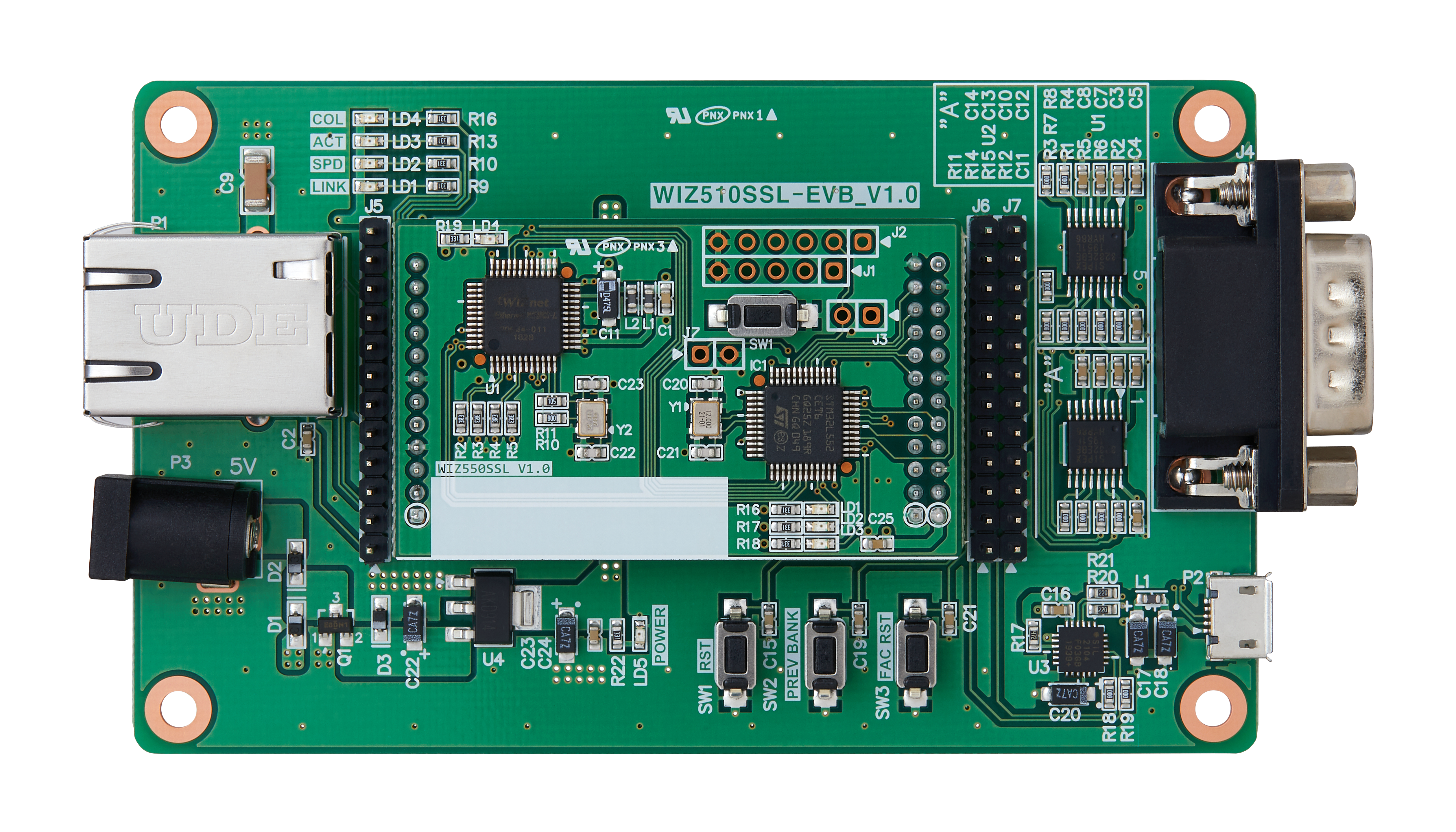 |
| Figure: Combining WIZ510SSL module and evaluation board |
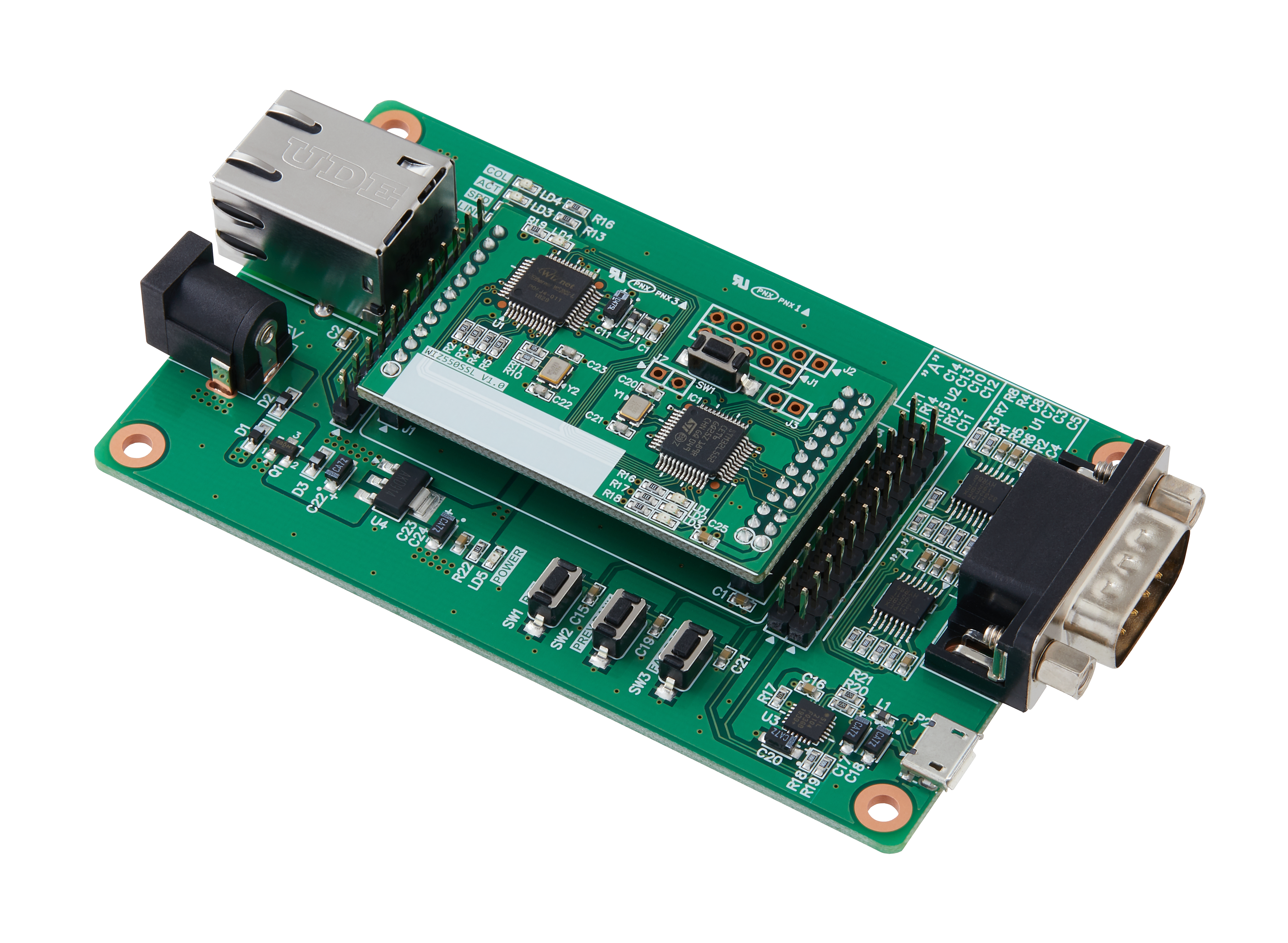 |
| Figure: WIZ510SSL evaluation board side view |
Step 2: Power on
Connect the 5V power adaptor or USB cable to the evaluation board and turn on the power switch.
- The power LED will turn red once the evaluation board is on.
Step 3: Search
Open the configuration tool and click the Device Search button. If the board is turned on and connected to the same network, the MAC address or settings of the WIZ510SSL module can be checked using the configuration tool.
The WIZ510SSL configuration tool can be downloaded from Github below.
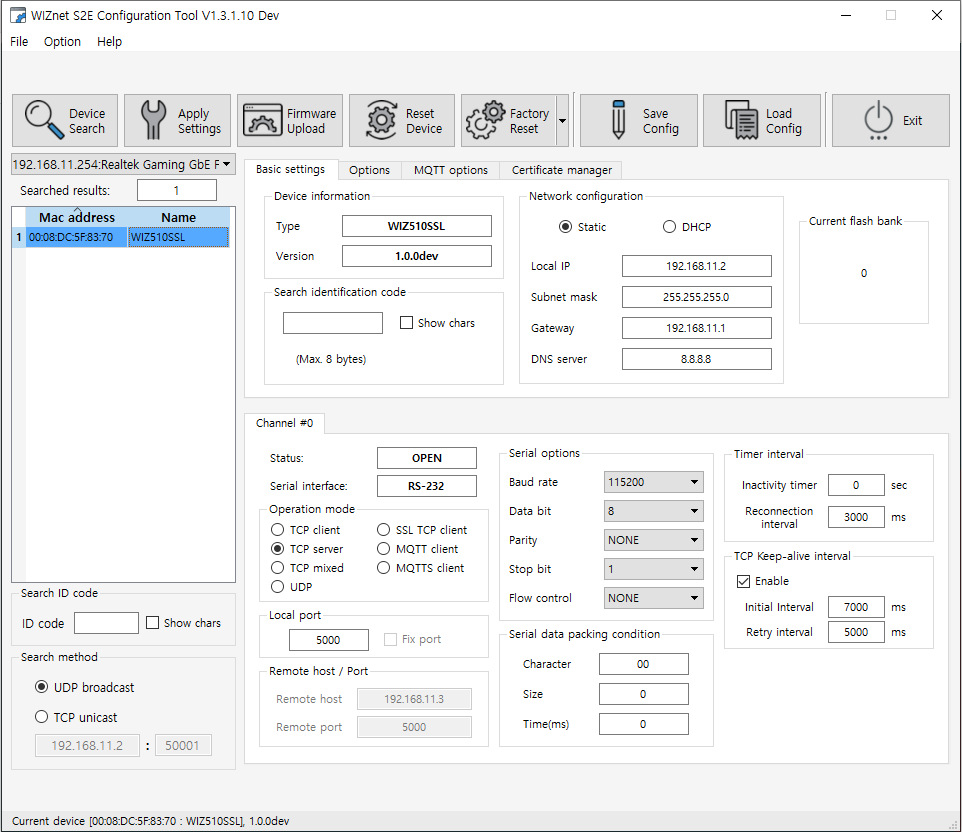 |
| Figure: WIZnet S2E Configuration Tool |
Step 4: Set up your WIZ510SSL
Change the settings accordingly to the customer’s environment. The test shown in this document is based on factory setting.
- Click the Apply Settings button to apply the changes in settings of the configuration tool.
Step 5: Connect
Connect the PC as the TCP client of the user’s serial device for data communication testing. In order to do this, the serial terminal program / TCP client terminal program must be opened on the PC. The serial terminal program and TCP client program must be set as below.
- Serial terminal program: 115200-8-N-1, Flow control: None
- TCP client program: 192.168.11.2:5000 (The IP address and port number of WIZ510SSL)
The COM port for serial terminal program connection can be checked as below.
- Control Panel > System > Device Manager
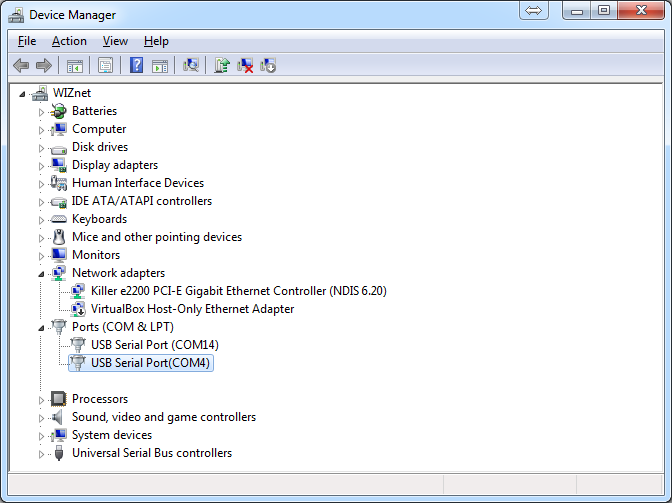 |
| Figure: Device Manager |
Step 6: Verify
The basic data communication of the WIZ510SSL can be verified as below.
-
Serial to Ethernet: data communication verification
- Enter the character string in the serial terminal and check if the identical character string appears on the TCP client terminal.
-
Ethernet to Serial: data communication verification
- Enter the character string in the TCP client terminal and check if the identical character string appears on the serial terminal.
Step 7: Done
Now you’re ready to use the WIZ510SSL!
-
This document is based on the assumption of the PC as the serial device / remote network device.
-
The next step is to connect the WIZ510SSL module to the target serial device and check if the device can communicate, control, and monitor via the remote PC or monitoring server.
If there is any problem? Please refer to our Troubleshooting Guide!